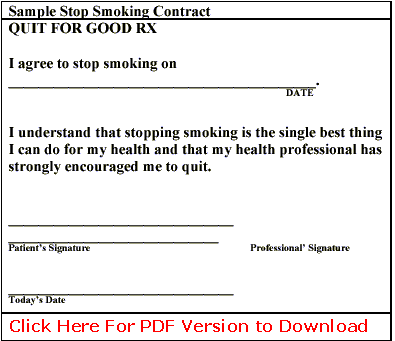The 5As Assist
Help the patient quit
- Every physician should become comfortable and knowledgeable in an approach to aid patients with smoking cessation. She/He should help those ready to quit with brief advice and pharmacologic therapy.
Assist those ready to make a quit attempt by:

Helping the patient set a
QUIT DATE.
- Quit date abstinence is a strong predictor of long-term success. The quit date should be soon; ideally within 2 weeks in order to give the patient time to prepare to stop. Advise against stopping at high-stress times; suggest instead a significant date (i.e. the patient's or spouse's birthday or the first day of the month). In order to ensure a successful quit date, advise and assist the patient in preparing:
Inform family, friends, and co-workers of quitting and request understanding and support.
- Remove cigarettes from the environment. Prior to quitting, avoid smoking in places where a lot of time is spent (i.e. home, car).
- Review previous quit attempts. "What helped you?" "What led to relapse?"
- Anticipate challenges to planned quit attempt, particularly during the critical first few weeks. These include NICOTINE WITHDRAWAL SYMPTOMS.
- Consider signing a STOP-SMOKING CONTRACT with the patient, acknowledging the patient's decision to stop smoking and noting the quit date.

Giving key advice on successful quitting.
- Abstinence--total abstinence is essential.
- Alcohol--Inform the patient that drinking alcohol is highly associated with relapse. Those who stop smoking should review their alcohol use and consider limiting/abstaining from alcohol during the quit process.
- Other smokers in the household--The presence of other smokers in the household, particularly a spouse, is associated with lower success rates. If another smoker lives in the home, urge the patient to quit with the other smoker and/or develop specific plans to stay quit in a household where others still smoke.
- Encourage PHARMACOLOGIC THERAPY for all smokers without contradictions.
- Consider nicotine replacement especially for highly addicted patients (those who smoke one pack a day or more or who smoke their first cigarette within 30 minutes of waking).
- Click HERE for information on Pharmacotherapy options and patient handouts.
- Click HERE for a Patient Handout in PDF format.
Providing self-help materials and information on community programs.
- The information should be culturally/racially/educationally/age appropriate for the patient
- It should be readily available in every clinic office.
- The smoking cessation coordinator and/or the physician should review the self-help material to be prepared to answer patient questions about it.
Refering to more intensified counseling as appropriate.
- Giving congratulations, encouragement, and a statement of concern that he/she remain abstinent. Assure the patient that a slip is not a disaster and encourage the patient to keep trying.
If the patient is not willing to quit now:
- Providing motivating literature (or call 1-800-4-CANCER for NCI's Why Do You Smoke? pamphlet)
- Asking again at the next visit.